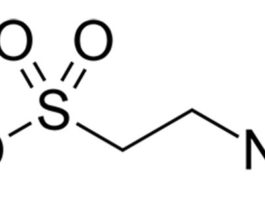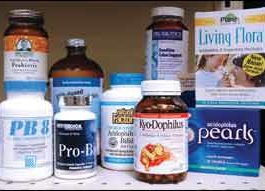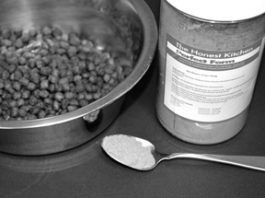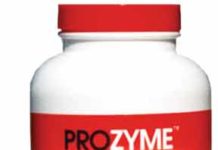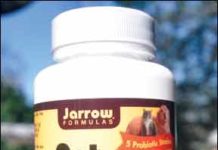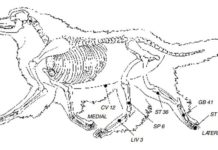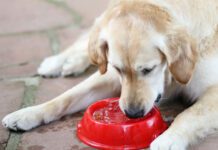Does Your Dog Have Gas?
It is normal for dogs to have an occasional bout of gas. But it is not normal for flatulence to occur all the time. Flatulence can be relieved quickly in dogs by use of simethicone, the same anti-foaming drug that is marketed for humans in a variety of over-the-counter preparations. Simethicone is generally accepted as safe for dogs, even in human-sized doses. However, there may be some drawbacks to the use of Gaviscon, Gas-X, or any other simethicone product in your dog.
Herbal Remedies for Inflammatory Bowel Disease (IBD)
Conventional approaches to inflammatory bowel disease often involve a controlled diet of highly digestible foods that are rich in supplemental dietary fiber. Often, cortico-steroid drugs (such as Prednisone) and other immunosuppressive drugs are prescribed to rapidly reduce pain and inflammation. These drugs may bring fast, temporary relief from painful symptoms, but they can be risky, especially if employed long-term.
Fecal Transplants for Dogs
A healthy microbiome destroys harmful pathogens, including disease-causing viruses, fungi, bacteria, and parasites. As a result, the microbiome is the immune system's first line of defense. Differences in microbiomes help explain why some dogs exposed to diseases like parvovirus, distemper, leptospirosis, Lyme disease, canine flu, heartworm, or kennel cough get sick while others remain symptom-free.
Improve Your Dog’s Digestion with Digestive Enzyme Supplements
All dogs need digestive enzymes in order to break down their food, making the nutrients available for absorption. In most cases, the pancreas produces ample enzymes and no supplementation is required. Older dogs and dogs with digestive disorders may benefit from enzyme supplementation. Dogs with exocrine pancreatic insufficiency (EPI), where the pancreas is no longer able to produce enzymes, require prescription-strength enzymes in order to survive. Digestive enzymes might also help dogs with food allergies and intolerances.
How Prebiotics Improve Your Dog’s Digestion
Prebiotics (no, it's not a typo) nourish probiotics, the beneficial bacteria discussed last month that support your dog's digestive health, the immune system, and more. A prebiotic is de?ned as a nondigestible food ingredient that bene?cially affects the host by selectively stimulating the growth and/or activity of one or a limited number of bacteria in the colon and thus improves host health.""
Probiotics Boost Canine Overall Health
Who hasn't heard of friendly" or "beneficial" bacteria? Even acidophilus
Acupressure Improves Your Dog’s Digestion
If not for their dinner bowls, dogs would still be wolves. In many ways our devoted, domesticated dogs are still wolves, especially when it comes to their digestion. In the past 10 years, holistically oriented guardians and healthcare practitioners have become proponents of fresh food diets plus supplements for dogs. There are many authoritative books, journals, and magazines that are doing their best to raise the consciousness of the general public about the health issues associated with manufactured dog foods.
Wobenzym: A Digestive Enzyme Supplement for Dogs
Even when their formulas don't change, there's always something new to discover about old, familiar products. This month we're updating information on the safety and uses of Wobenzym, a supplement that became a favorite of many WDJ readers after our article on the product (Banking on Enzymes") appeared in January 2001. Charles Green is America's largest Wobenzym distributor. When his Las Vegas supplement store was listed as a resource in the article
Probiotics and Dogs
Curly, a five-year-old Standard Poodle, eats the best food his human can afford. Raw chicken, rabbit, and venison are his favorites. Tina, his two-legged companion, switches the meats every few days, mixing the protein with some sweet potato, carrots, an occasional stalk of broccoli, and always a good fish oil supplement. Plus, to be sure that Curly is getting full nutritional benefit from every delicious bite, Tina always adds a sprinkling of a probiotic and digestive enzyme supplement as a final touch. Everything Curly eats is the best of the best: human-grade ingredients, no preservatives, no by-products. But somehow, despite all of the good lovin' and great food, Curly is a bit thin, won't put on weight, and his stool is sometimes dry making it hard for the poor guy to poop during his daily walks. Tina knows that something is amiss and she is worried. She was told that maybe the probiotics weren't active, so she tried several different brands. But nothing has improved. So what gives; is it that the probiotics don't work? Adding supplemental Lactobacillus acidophilus, Bifidobacterium bifidum, Lactobacillus bulgaricus, or other probiotic organisms to your dog's diet is almost always a good idea. This will support the resident microflora that are always present in Curly's gut, enhancing digestion and absorption of nutrients, supporting detoxification and elimination processes, and helping to boost his immune system.
Colitis: An Urgent Problem
Conventional medical practitioners use the word colitis to indicate inflammation of the colon (the large intestine), as opposed to inflammation of the small intestine or the stomach. One of the large intestine’s most important roles is to absorb water. If the colon is not functioning properly, a lot of water is left in the stool; that’s diarrhea. There are many different types of diarrhea, and, unpleasant as it may be to contemplate, the characteristics of the diarrhea help us identify which part of the dog’s digestive system is not working properly.
When a Low-Protein “Kidney Diet” Is Not the Answer
Every day, thousands of dogs are diagnosed with kidney disease. The first suggestion most conventional veterinarians make is to switch from whatever the dog has been eating to a low-protein “kidney diet” food. Clients are sent home with bags or cans of “prescription” food and warned not to feed high-protein foods or treats of any kind.



